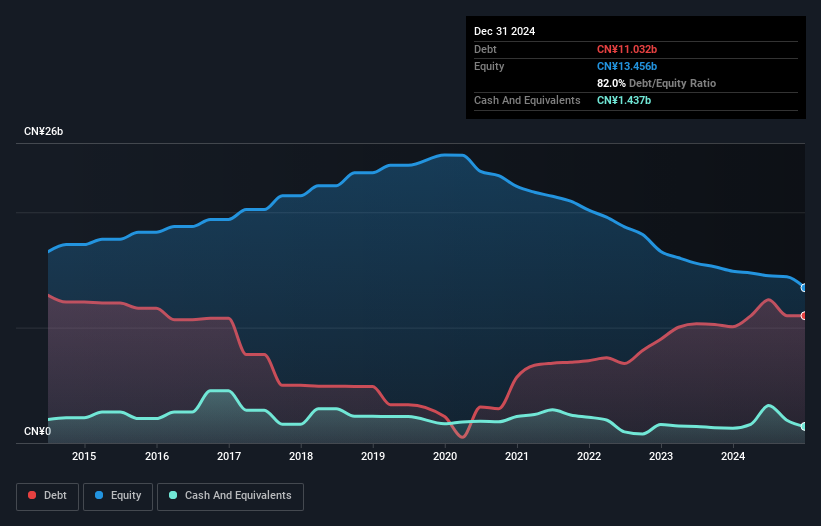
Warren Buffett famously said, 'Volatility is far from synonymous with risk.' It's only natural to consider a company's balance sheet when you examine how risky it is, since debt is often involved when a business collapses. As with many other companies Beijing Capital International Airport Company Limited (HKG:694) makes use of debt. But the real question is whether this debt is making the company risky.
When Is Debt A Problem?
Debt is a tool to help businesses grow, but if a business is incapable of paying off its lenders, then it exists at their mercy. Part and parcel of capitalism is the process of 'creative destruction' where failed businesses are mercilessly liquidated by their bankers. However, a more usual (but still expensive) situation is where a company must dilute shareholders at a cheap share price simply to get debt under control. Having said that, the most common situation is where a company manages its debt reasonably well - and to its own advantage. When we examine debt levels, we first consider both cash and debt levels, together.
How Much Debt Does Beijing Capital International Airport Carry?
The image below, which you can click on for greater detail, shows that at December 2024 Beijing Capital International Airport had debt of CN¥11.0b, up from CN¥10.1b in one year. On the flip side, it has CN¥1.44b in cash leading to net debt of about CN¥9.59b.

How Strong Is Beijing Capital International Airport's Balance Sheet?
Zooming in on the latest balance sheet data, we can see that Beijing Capital International Airport had liabilities of CN¥13.0b due within 12 months and liabilities of CN¥4.21b due beyond that. On the other hand, it had cash of CN¥1.44b and CN¥1.08b worth of receivables due within a year. So its liabilities total CN¥14.7b more than the combination of its cash and short-term receivables.
Given this deficit is actually higher than the company's market capitalization of CN¥12.3b, we think shareholders really should watch Beijing Capital International Airport's debt levels, like a parent watching their child ride a bike for the first time. Hypothetically, extremely heavy dilution would be required if the company were forced to pay down its liabilities by raising capital at the current share price. When analysing debt levels, the balance sheet is the obvious place to start. But ultimately the future profitability of the business will decide if Beijing Capital International Airport can strengthen its balance sheet over time. So if you're focused on the future you can check out this free report showing analyst profit forecasts.
See our latest analysis for Beijing Capital International Airport
Over 12 months, Beijing Capital International Airport reported revenue of CN¥5.5b, which is a gain of 20%, although it did not report any earnings before interest and tax. With any luck the company will be able to grow its way to profitability.
Caveat Emptor
Despite the top line growth, Beijing Capital International Airport still had an earnings before interest and tax (EBIT) loss over the last year. Indeed, it lost CN¥336m at the EBIT level. When we look at that alongside the significant liabilities, we're not particularly confident about the company. We'd want to see some strong near-term improvements before getting too interested in the stock. For example, we would not want to see a repeat of last year's loss of CN¥1.4b. And until that time we think this is a risky stock. The balance sheet is clearly the area to focus on when you are analysing debt. However, not all investment risk resides within the balance sheet - far from it. To that end, you should be aware of the 1 warning sign we've spotted with Beijing Capital International Airport .
When all is said and done, sometimes its easier to focus on companies that don't even need debt. Readers can access a list of growth stocks with zero net debt 100% free, right now.
Have feedback on this article? Concerned about the content? Get in touch with us directly. Alternatively, email editorial-team (at) simplywallst.com.
This article by Simply Wall St is general in nature. We provide commentary based on historical data and analyst forecasts only using an unbiased methodology and our articles are not intended to be financial advice. It does not constitute a recommendation to buy or sell any stock, and does not take account of your objectives, or your financial situation. We aim to bring you long-term focused analysis driven by fundamental data. Note that our analysis may not factor in the latest price-sensitive company announcements or qualitative material. Simply Wall St has no position in any stocks mentioned.